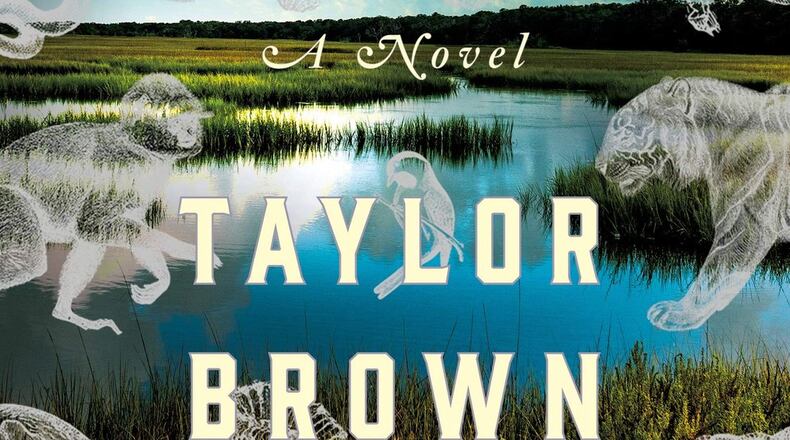In Savannah author Taylor Brown's new novel, "Pride of Eden," practically every character has a spirit animal. Anse loves lions, enough to try to embrace one that's lunging at him, snarling. Lope, who shoots the lion and saves Anse's life, is a falconer; the birds calm him. Tyler, Anse's lover and a veterinarian, is called "Tiger Lady" after walking among two escaped tigers who bow before her and don't harm her. Malaya perhaps doesn't identify with a single creature but vibrates emotionally when witnessing the suffering of safari animals at the hands of poachers.
All of these people are a little feral, ill at ease among the dark work of humans.
That makes sense. Anse, Tyler, Lope and Malaya operate Little Eden, a sanctuary for wild animals near Savannah. Anse runs it; it’s his vision and solace. Together, they’ve rescued trophy cats (lions, tigers, panthers) caught and caged for sport by millionaires with more money than sense. They’ve freed exotic parrots who have been captured and treated cruelly by smugglers. They’ve shot at poachers who used chainsaws to cut off the horns of live elephants and rhinos. They’ve chased wolf breeders and crocodile hunters. They’ve witnessed chained, starving mammals of all kinds living in too-small spaces, sleeping in their own feces and pecking out tufts of their own fur, all so smugglers could make quick, illegal bucks selling them to tourists.
The Little Eden caretakers have seen the worst casual cruelty and bloody, visceral violence that humans inflict on the wild world.
Brown doesn’t flinch from the gruesomeness of what they see, the remains of all that they can’t save. “Pride of Eden” features rough stuff — flesh tearing, bones breaking, gashes, gushes and gnawings — on almost every page. But Brown’s prose is lush, ornate, with an intricate melancholy that is poetic in its savagery.
That savagery is strange and mysterious, like a Werner Herzog movie such as “Grizzly Man” or “Aguirre, the Wrath of God.” When a lion kills a deer, Brown describes the big cat tearing “away swaths of her silver-brown hide, revealing the red luster of her meat.” In “Pride of Eden,” humans often dream wildly, becoming animals or merging with the landscape. When Lope falls asleep, he becomes his beloved falcon, “high over the coast, kiting against the stars, reading the white language of heat across the earth.” Even the sex is harsh, fierce and otherworldly: “They lay tangled now, their skin burning with new scratches and abrasions. Anse pulled a shred of Tyler’s hair from his mouth.”
Humans are at war with this novel’s world. The threat of climate change looms large in “Pride of Eden,” as does the devastation caused by military action. To hone in on the point, two of the novel’s protagonists have served in the armed forces, and the physical and psychological warfare have left deep, burning scars. Every human and creature — Brown’s prose enters the minds of animals frequently — sees the world through the lens of combat, blood and watchful fear.
The novel feels apocalyptic in its imagination, biblical in its searing vision. It can’t be accidental that there’s a sequence in which Anse and Malaya save a cluster of creatures from a boy’s makeshift ark. The kid is preparing, literally, for the next flood. They catch another man breeding fierce wolves and preparing to head with them into the mountains, sure that the glacier melt will drown us all.
Everyone is scanning their eyes across the horizon, looking for the rumbling waters or the mushroom cloud. “Pride of Eden” turns toward the primordial, with the author connecting the present day (the so-called Anthropocene, the Human Age) to the savage Jurassic period of dinosaurs. Anse, who runs Little Eden, even dreams periodically of being a saber tooth tiger.
It’s a novel dense with environmental and moral decay. The ruin is conveyed ornately, with Brown vividly showing our world being overtaken by kudzu and wildness, returning to its pre-human origins. The author is perhaps a little too in love with his pervasive depictions of violence toward animals. Initially, the horror made me throb with pain, but it quickly becomes numbing — though you might become a PETA member after reading the book. For every scene of rich sensory overload that jolts the consciousness, there’s another that tries too hard for cosmic effect, that stretches its metaphors and biblical undertones beyond their breaking points.
There’s also an unexplored tension throughout “Pride of Eden.” To sustain the denizens of the sanctuary, Little Eden’s caretakers must butcher hundreds of non-exotic animals every week, from deer to roadkill to prepare meat. Are those lives somehow worth less because they aren’t exotic, endangered animals? These humans are all complicit in this cruelty to animals (as are we all, even if we’re vegan), but the novel sidesteps this issue entirely.
While Brown is so good at portraying interior lives, “Pride of Eden’s” relationships between people are under-served. There’s a quasi-love triangle between Anse (a man old enough to have served in Vietnam) and two considerably younger women (one of whom is young enough to have served in Iraq) that doesn’t make emotional sense. And it’s weird that these women don’t seem to have any other friends or acquaintances. I longed to see their connections to other people.
Still, “Pride of Eden’s” ambition to connect us all with the natural world more forcefully is riveting, all the more so for being so smeared with blood. As a novel, it’s a savage tiger: fierce, proud and mysterious.
FICTION / NOVEL
by Taylor Brown
St. Martin’s Press
288 pages, $26.99
About the Author
Keep Reading
The Latest
Featured

